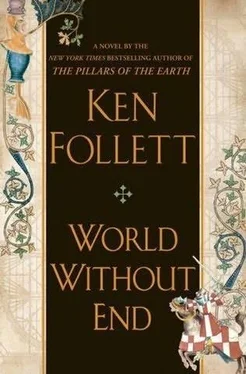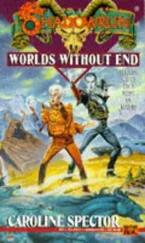It was like a feast day. Dick Brewer was selling tankards of ale from a barrel on a cart, and Betty Baxter’s four adolescent daughters were walking around with trays of spiced buns for sale. The wealthier townspeople were done up in fur caps and new shoes, and even the poorer women had dressed their hair and trimmed their cloaks with new braid.
Merthin was the only child carrying a bow, and he immediately attracted the attention of other children. They crowded around him and Ralph, the boys asking envious questions, the girls looking admiring or disdainful according to temperament. One of the girls said: “How did you know how to make it?”
Merthin recognized her: she had stood near him in the cathedral. She was about a year younger than himself, he thought, and she wore a dress and cloak of expensive, close-woven wool. Merthin usually found girls of his own age tiresome: they giggled a lot and refused to take anything seriously. But this one looked at him and his bow with a frank curiosity that he liked. “I just guessed,” he said.
“That’s clever. Does it work?”
“I haven’t tried it. What’s your name?”
“Caris, from the Wooler family. Who are you?”
“Merthin. My father is Sir Gerald.” Merthin pushed back the hood of his cape, reached inside it and took out a coiled bowstring.
“Why do you keep the string in your hat?”
“So it won’t get wet if there’s rain. It’s what the real archers do.” He attached the twine to the notches at either end of the stave, bending the bow slightly so that the tension would hold the string in place.
“Are you going to shoot at the targets?”
“Yes.”
Another boy said: “They won’t let you.”
Merthin looked at him. He was about twelve, tall and thin with big hands and feet. Merthin had seen him last night in the priory hospital with his family: his name was Philemon. He had been hanging around the monks, asking questions and helping to serve supper. “Of course they’ll let me,” Merthin told him. “Why shouldn’t they?”
“Because you’re too young.”
“That’s stupid.” Even as he spoke, Merthin knew he should not be so sure: adults often were stupid. But Philemon’s assumption of superior knowledge irritated him, especially after he had shown confidence in front of Caris.
He left the children and walked over to a group of men waiting to use a target. He recognized one of them: an exceptionally tall, broad-shouldered man called Mark Webber. Mark noticed the bow and spoke to Merthin in a slow, amiable voice. “Where did you get that?”
“I made it,” Merthin said proudly.
“Look at this, Elfric,” Mark said to his neighbour. “He’s made a nice job of it.”
Elfric was a brawny man with a sly look. He gave the bow a cursory glance. “It’s too small,” he said dismissively. “That’ll never fire an arrow to penetrate a French knight’s armour.”
“Perhaps not,” Mark said mildly. “But I expect the lad’s got a year or two to go before he has to fight the French.”
John Constable called out: “We’re ready, let’s get started. Mark Webber, you’re first.” The giant stepped up to the line. He picked up a stout bow and tested it, bending the thick wood effortlessly.
The constable noticed Merthin for the first time. “No boys,” he said.
“Why not?” Merthin protested.
“Never mind why not, just get out of the way.”
Merthin heard some of the other children snigger. “There’s no reason for it!” he said indignantly.
“I don’t have to give reasons to children,” John said. “All right, Mark, take your shot.”
Merthin was mortified. The oily Philemon had proved him wrong in front of everyone. He turned away from the targets.
“I told you so,” said Philemon.
“Oh, shut up and go away.”
“You can’t make me go away,” said Philemon, who was six inches taller than Merthin.
Ralph put in: “I could, though.”
Merthin sighed. Ralph was unfailingly loyal, but he did not see that for him to fight Philemon would only make Merthin look like a weakling as well as a fool.
“I’m leaving anyway,” said Philemon. “I’m going to help Brother Godwyn.” He walked off.
The rest of the children began to drift away, seeking other curiosities. Caris said to Merthin: “You could go somewhere else to try the bow.” She was obviously keen to see what would happen.
Merthin looked around. “But where?” If he was seen shooting unsupervised, the bow might be taken from him.
“We could go into the forest.”
Merthin was surprised. Children were forbidden to go into the forest. Outlaws hid there, men and women who lived by stealing. Children might be stripped of their clothes, or made into slaves, and there were worse dangers that parents only hinted at. Even if they escaped such perils, the children were liable to be flogged by their fathers for breaking the rule.
But Caris did not seem to be afraid, and Merthin was reluctant to appear less bold than she. Besides, the constable’s curt dismissal had made him feel defiant. “All right,” he said. “But we’ll have to make sure no one sees us.”
She had the answer to that. “I know a way.”
She walked towards the river. Merthin and Ralph followed. A small three-legged dog tagged along. “What’s your dog’s name?” Merthin asked Caris.
“He’s not mine,” she said. “But I gave him a piece of mouldy bacon, and now I can’t shake him off.”
They walked along the muddy bank of the river, past warehouses and wharves and barges. Merthin covertly studied this girl who had so effortlessly become the leader. She had a square, determined face, neither pretty nor ugly, and there was mischief in her eyes, which were a greenish colour with brown flecks. Her light-brown hair was done in two plaits, as was the fashion among affluent women. Her clothes were costly, but she wore practical leather boots rather than the embroidered fabric shoes preferred by noble ladies.
She turned away from the river and led them through a timber yard, and suddenly they were in scrubby woodland. Merthin felt a pang of unease. Now that he was in the forest, where there might be an outlaw lurking behind any oak tree, he regretted his bravado; but he would be ashamed to back out.
They walked on, looking for a clearing big enough for archery. Suddenly Caris spoke in a conspiratorial voice. “You see that big holly bush?”
“Yes.”
“As soon as we’re past it, crouch down with me and keep silent.”
“Why?”
“You’ll see.”
A moment later Merthin, Ralph and Caris squatted behind the bush. The three-legged dog sat with them and looked hopefully at Caris. Ralph began to ask a question, but Caris hushed him.
A minute later a little girl came by. Caris jumped out and grabbed her. The girl screamed.
“Be quiet!” Caris said. “We’re not far from the road, and we don’t want to be heard. Why are you following us?”
“You’ve got my dog, and he won’t come back!” the child sobbed.
“I know you, I met you in church this morning,” Caris said to her in a softer voice. “All right, there’s nothing to cry about, we aren’t going to do you any harm. What’s your name?”
“Gwenda.”
“And the dog?”
“Hop.” Gwenda picked up the dog, and he licked her tears.
“Well, you’ve got him now. You’d better come with us, in case he runs off again. Besides, you might not be able to find your way back to town on your own.”
They went on. Merthin said: “What has eight arms and eleven legs?”
“I give up,” Ralph said immediately. He always did.
“I know,” said Caris with a grin. “It’s us. Four children and the dog.” She laughed. “That’s good.”
Читать дальше












